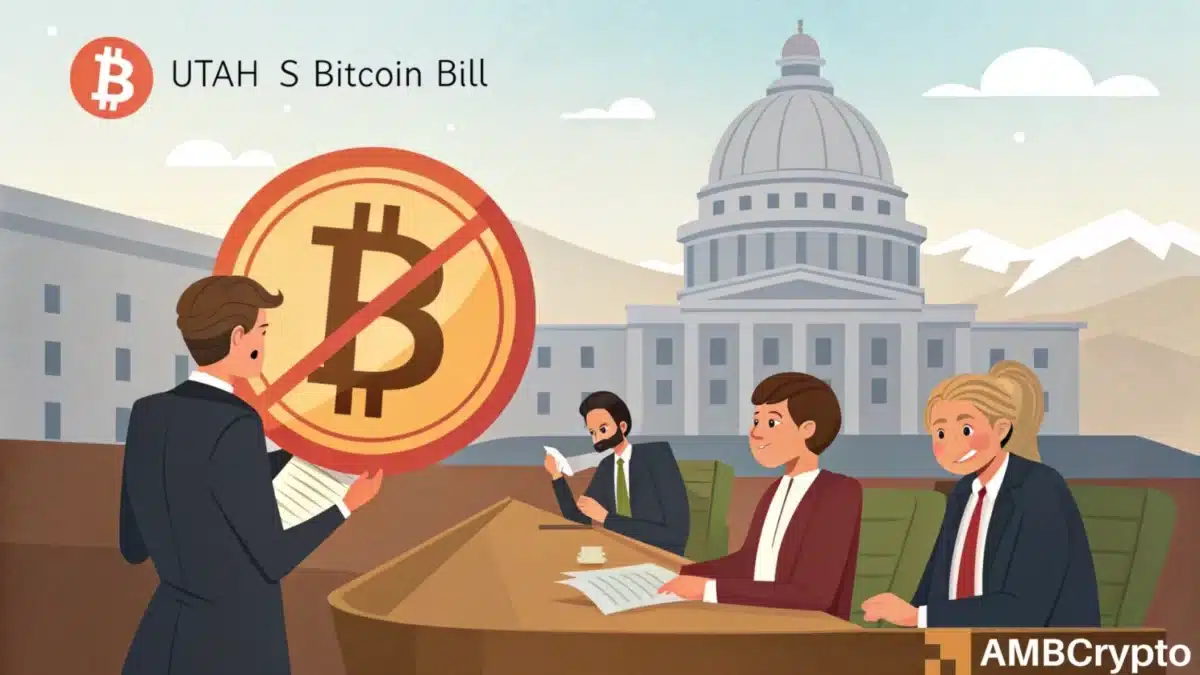Utah backs blockchain but rejects Bitcoin Reserve – All you need to know!

- Utah removes the Bitcoin reserve clause but advances broader blockchain rights protections.
- Trump’s Strategic Bitcoin Reserve fuels growing state and federal crypto adoption momentum.
Utah’s push for Bitcoin [BTC] faced a major setback as lawmakers scrapped a key provision from its blockchain bill before final approval.
The state Senate recently approved HB230, the “Blockchain and Digital Innovation Amendments” bill, but not without a key revision — the removal of the Bitcoin reserve clause.
Although this change reduces the bill’s impact, it strengthens digital asset rights, allowing residents to self-custody crypto. It also permits activities such as mining Bitcoin, running nodes, and staking assets within the state.
The bill is now awaiting Governor Spencer Cox’s approval, signaling Utah’s support for blockchain innovation. This development highlights Utah’s response to the growing national interest in state-level crypto policies.
Utah lawmakers withdraw key provisions from the Bitcoin bill
Remarking on the same, in Utah’s floor session on the 7th of March, one of the bill’s sponsors, Senator Kirk A. Cullimore said,
“There was a lot of concern with those provisions and the early adoption of these types of policies. All of that has been stripped out of the bill.”
This move could have positioned Utah as the first state to establish a Bitcoin reserve.
However, despite passing earlier Senate readings, the ‘reserve clause’ was removed in the final vote, with the House later concurring in a 52-19-4 decision.
This is because the lawmakers cited concerns over the risks of state-backed crypto investments, reflecting a cautious approach toward digital asset adoption.
Other states and their Bitcoin bill status
However, despite Utah’s retreat from establishing a Bitcoin reserve, the broader movement for state-backed digital asset holdings continues to gain traction.
As of the 7th of March, 31 states have introduced Bitcoin reserve bills, with 25 still under active consideration.
Arizona and Texas have emerged as frontrunners, with their respective bills advancing through Senate committees and awaiting final votes.
Meanwhile, legislative efforts in states like Pennsylvania, Montana, and North Dakota have already stalled.
What’s going on at the federal level?
The momentum extends beyond state-level initiatives. President Donald Trump signed an executive order to establish a Strategic Bitcoin Reserve. This historic step highlights Bitcoin’s increasing importance in public finance at the federal level.
Despite a decline in Polymarket’s prediction data—dropping from a 45% chance on 7th March to just 30%, at press time—analysts’ confidence in a U.S. Bitcoin reserve remained strong.
Bitwise CIO Matt Hougan remains optimistic, asserting that Bitcoin will ultimately solidify its role as a reserve asset.
As expected, he put it best when he said,
“After the dust settles, I suspect the final reserve will be nearly entirely Bitcoin, and it will be larger than people think.”






